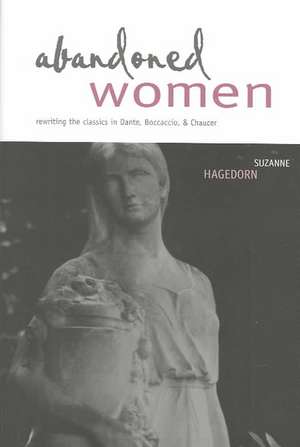Abandoned Women: Rewriting the Classics in Dante, Boccaccio, and Chaucer
Autor Suzanne C. Hagedornen Limba Engleză Hardback – 11 dec 2003
Medievalists have long been interested in the "abandoned woman," a figure historically used to examine the value of traditional male heroism. Moving beyond previous studies which have focused primarily on Virgil's Dido, Suzanne Hagedorn focuses on the vernacular works of Dante, Bocaccio, and Chaucer, arguing that revisiting the classical tradition of the abandoned woman enables one to reconsider ancient epics and myths from a female perspective and question assumptions about gender roles in medieval literature.
Preț: 525.72 lei
Preț vechi: 663.20 lei
-21% Nou
Puncte Express: 789
Preț estimativ în valută:
100.60€ • 107.57$ • 83.88£
100.60€ • 107.57$ • 83.88£
Carte indisponibilă temporar
Doresc să fiu notificat când acest titlu va fi disponibil:
Se trimite...
Preluare comenzi: 021 569.72.76
Specificații
ISBN-13: 9780472113491
ISBN-10: 0472113496
Pagini: 232
Dimensiuni: 152 x 229 x 20 mm
Greutate: 0.48 kg
Editura: UNIVERSITY OF MICHIGAN PRESS
Colecția University of Michigan Press
ISBN-10: 0472113496
Pagini: 232
Dimensiuni: 152 x 229 x 20 mm
Greutate: 0.48 kg
Editura: UNIVERSITY OF MICHIGAN PRESS
Colecția University of Michigan Press
Notă biografică
Suzanne Hagedorn is Associate Professor of English at the College of William and Mary.
Recenzii
"[A] bold and compelling exercise in close reading and comparative analysis. . . . Clear, thoughtful, and theoretically astute, this will be a valuable addition to collections in medieval English, Italian, and comparative literatures."
—Choice
"Suzanne Hagedorn's book on abandoned women enters a critical conversation that already possesses a strong and determinant shape."
—Modern Philology
"Hagedorn's writing is crisp and engaging throughout, her close readings consistently sensitive. This is a book—like those of Hagedorn's acknowledged critical influences, Winthrop Wetherbee and John Fleming—that unabashedly treats literary negotiations as the product of a dialogue of governing intelligences...Those who are skeptical of this critical approach are not likely to be converted by this fine book (nor, I think, is that its intent) but will nonetheless find within its pages a lucid, sometimes dazzling reanimation of medieval writers' literary responses to a classical topos that emerges as a capacious, elastic measure of the problematics of literary influence."
—Jamie C. Fumo, Speculum
—Choice
"Suzanne Hagedorn's book on abandoned women enters a critical conversation that already possesses a strong and determinant shape."
—Modern Philology
"Hagedorn's writing is crisp and engaging throughout, her close readings consistently sensitive. This is a book—like those of Hagedorn's acknowledged critical influences, Winthrop Wetherbee and John Fleming—that unabashedly treats literary negotiations as the product of a dialogue of governing intelligences...Those who are skeptical of this critical approach are not likely to be converted by this fine book (nor, I think, is that its intent) but will nonetheless find within its pages a lucid, sometimes dazzling reanimation of medieval writers' literary responses to a classical topos that emerges as a capacious, elastic measure of the problematics of literary influence."
—Jamie C. Fumo, Speculum
Descriere
Sheds light on the complex web of allusions that link medieval authors to their literary predecessors
